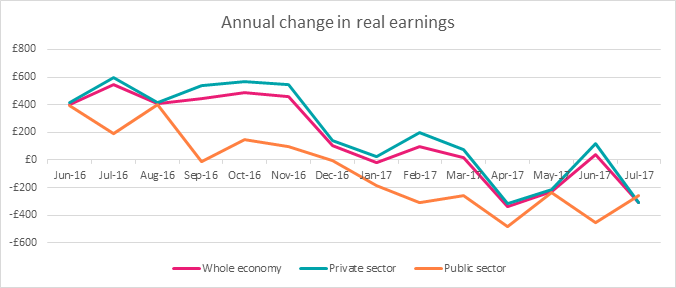SMF analysis of today's ONS earnings figures show that, on average, both private sector and public sector workers have seen their real earnings fall over the past twelve months.
Average gross earnings (total pay) for July 2017 were £505 per week. Combined with the latest inflation figures, taking the economy as a whole, workers are £309 (annualised) worse off than a year ago.
Private sector workers earned £503 per week on average in July 2017, which represents a £305 fall in annual income when compared to a year ago.
In the public sector, average gross pay was £512 per week; with inflation rising, they earn £258 less than they did a year ago.
Commenting on the findings, SMF chief economist Scott Corfe said:
“After adjusting for inflation, workers are significantly worse off than they were a year ago. In part this reflects the increase in the cost of living as a weak currency has pushed up the price of imported goods.
“But it also reflects weak earnings growth which remains stubbornly stuck in the doldrums. Improving productivity to boost pay is absolutely critical.”
“With total pay growth lower in the private sector than the public sector in July, the government will be under more pressure to boost the pay of all workers in the economy. Lifting the public sector pay cap benefits less than a fifth of the workforce.”

Methodology
We combined weekly average gross earnings (total pay) with CPI inflation to calculate real earnings per week.
We then annualised these and reported the annual change.
We used ONS datasets KAB9, KAC4 and KAC7 (seasonally adjusted) to analyse changes within the economy as a whole, as well as the private and public sectors.
Average gross earnings refer to Great Britain.
